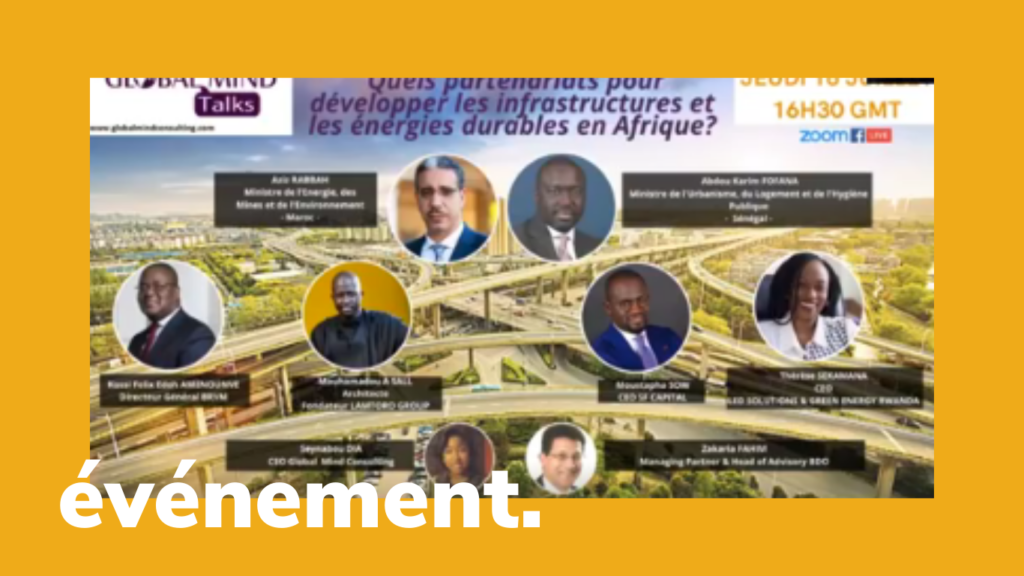
“5 billion euros have been invested in renewable energy in Morocco. Almost as much is expected by 2030,” says Aziz Rebbah, Moroccan Minister of Energy, Mines and Sustainable Development. Speaking on Thursday 16 July on the sidelines of the second edition of Global Mind Talks organized by the strategy and public relations consultancy GLOBAL MIND CONSULTING and BDO Morocco, devoted to partnerships in infrastructure, the Minister estimates that the rate of rural electrification in the kingdom is 99.7% with an objective to go beyond lighting to support socio-economic activities.
Located at the crossroads of logistical and energy interconnections between Europe and Africa, Morocco’s energy mix consists of 40% renewable energy with a goal to increase this ratio to 52% through self-production and the growing role of the private sector. In Senegal, too, the transformation involves a law on PPPs aimed at providing a framework for public-private partnerships, says Abdou Karim Fofana, Minister of Urban Planning, Housing and Public Hygiene. “Until 2012, Senegal had no more than 32 km of highways. In seven years, we have added more than 200 km of highways since then and doubled the country’s electrical power, which also has more than 93% access to water in urban areas.
The role of the private sector
The setting presented by the two ministers and Seynabou DIA, CEO of Global Mind Consulting, broadened the debate to include invited experts, notably the business banker Moustapha Sow, CEO of SF Capital, for whom the financing of energy infrastructure through public-private partnership is commonly done through the Power Purchase Agreement (PPA), with state guarantees. “This is the ideal model for the energy sector, but also for roads, airports and health. But, adds the investment banker, with the exception of energy, there is a liquidity market that is not used. “Our states had recourse to sovereign debt, with China and Turkey, which have become our main backers. Today’s context forces us to rethink all this. The good side of covid-19, if it exists, obliges us to review the way we finance our infrastructures with increasingly reduced debt capacities. For the Senegalese financier, very clear PPP laws will have to encourage donors such as the IDB, the ADB, and, among others, the World Bank to review their debt criteria.
SME clusters to improve local content
For her part, Thérèse SEKEMANA, CEO of LED Solutions and Green Energy Rwanda, which is developing two hydropower plants in her country, believes that expertise is essential. “For example, our field is new. We need to find partners who come for the long term,” calling for a difference between access to lighting and access to energy. For his part, Mouhamadou Abass Sall, Architect and founder of LAMTÔRO GROUP, drew attention to the dissociation between the time of infrastructure projects, which is necessarily long, and political time, which is short and cyclical, while Zakaria Fahim, who works with 12 clusters of SMEs in Morocco, invited the latter to work in groups to improve local content. The breakdown of international financing chains invites Africa to revisit its internal financial architectures, most speakers acknowledged. “We must therefore learn to mobilize long-term resources on the basis of local, regional or continental savings,” suggested Dr. Edoh Kossi Amenounvé, Director General of the Regional Securities Exchange (BRVM). The crisis forces us to take up the challenge of reducing dependence through a regional and international approach, which is more relevant than a national approach.”
Beyond its objectives of catching up on infrastructure, the public-private partnership must therefore have a driving effect on SMEs and create jobs and social development. The PPP is also a response to the limits posed by debt and the budget deficit, recalls Moustapha Sow, inviting the African private sector to open up to partnership. In Morocco, PPP has gone hand in hand with national preference. “Infrastructure projects are developed 95% by companies under Moroccan law,” explains Minister Aziz Rebbah. “International agreements accept this,” he continues, recalling that the majority of international companies involved in PPP projects have created subsidiaries in Morocco. “It is necessary to create national champions if they do not exist,” said Minister Aziz Rebbah. As the webinar was dedicated to infrastructure partnerships, it was largely about the conditions for investing and co-investing in Morocco and sub-Saharan Africa. The two ministers were in favor of the dynamics of inter-African partnerships through African joint ventures.
Source: Financial Afrik
